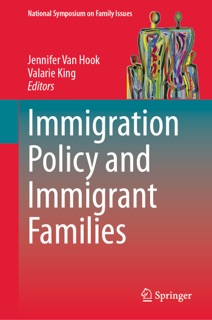This book examines how immigration law impacts U.S. immigrant families. It addresses how admission and border policies shape family formation and contribute to prolonged family separation; how immigration enforcement affects parenting practices; and how immigrants’ unique challenges spill over to influence broader kinship support networks. Chapters describe family reunification and separation policies; return migration and binational family life; how young immigrants reconnect with family abroad and navigate romantic relationships in the United States; parents’ engagement with surveilling actors and institutions; the impact of immigration policy on parenting, including during the pandemic; the health and well-being of DACA (Deferred Action for Childhood Arrivals)-eligible adults and their children; aging and family dynamics among Asian immigrant families; and the impact of immigrant legal status across generations. Finally, the volume offers recommendations for family researchers on ways to advance our understanding of the short and longer-term effects of immigration law and policies on the formation, structure, and functioning of immigrant families.
Key areas of coverage include:
Immigrant laws and policies that shape the formation and separation of immigrant families.
Immigrant parenting in the context of immigration enforcement.
Effects of DACA and other immigrant policies on child and adult health and well-being.
Long-term impacts of immigration policy over time and across generations.
Opportunities for family research to better understand how immigration policies and practices shape families, parenting, and child health and well-being.
Immigration Policy and Immigrant Families is a must-have resource for researchers, professors, and graduate students as well as clinicians, therapists, and other professionals in developmental psychology, family studies, sociology, and such interrelated disciplines as demography, social work, prevention science, public health, educational policy, political science, and economics.







